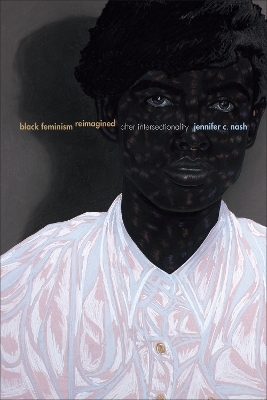
Black Feminism Reimagined
After Intersectionality
Seiten
2019
Duke University Press (Verlag)
978-1-4780-0059-4 (ISBN)
Duke University Press (Verlag)
978-1-4780-0059-4 (ISBN)
Jennifer C. Nash reframes black feminism's engagement with intersectionality, contending that black feminists should let go of their possession and policing of the concept in order to better unleash black feminist theory's visionary and world-making possibilities.
In Black Feminism Reimagined Jennifer C. Nash reframes black feminism's engagement with intersectionality, often celebrated as its primary intellectual and political contribution to feminist theory. Charting the institutional history and contemporary uses of intersectionality in the academy, Nash outlines how women's studies has both elevated intersectionality to the discipline's primary program-building initiative and cast intersectionality as a threat to feminism's coherence. As intersectionality has become a central feminist preoccupation, Nash argues that black feminism has been marked by a single affect—defensiveness—manifested by efforts to police intersectionality's usages and circulations. Nash contends that only by letting go of this deeply alluring protectionist stance, the desire to make property of knowledge, can black feminists reimagine intellectual production in ways that unleash black feminist theory's visionary world-making possibilities.
In Black Feminism Reimagined Jennifer C. Nash reframes black feminism's engagement with intersectionality, often celebrated as its primary intellectual and political contribution to feminist theory. Charting the institutional history and contemporary uses of intersectionality in the academy, Nash outlines how women's studies has both elevated intersectionality to the discipline's primary program-building initiative and cast intersectionality as a threat to feminism's coherence. As intersectionality has become a central feminist preoccupation, Nash argues that black feminism has been marked by a single affect—defensiveness—manifested by efforts to police intersectionality's usages and circulations. Nash contends that only by letting go of this deeply alluring protectionist stance, the desire to make property of knowledge, can black feminists reimagine intellectual production in ways that unleash black feminist theory's visionary world-making possibilities.
Jennifer C. Nash is Associate Professor of African American Studies and Gender and Sexuality Studies at Northwestern University, author of The Black Body in Ecstasy: Reading Race, Reading Pornography, also published by Duke University Press, and editor of Gender: Love.
Acknowledgments vii
Introduction: Feeling Black Feminism 1
1. A Love Letter from a Critic, or Notes on the Intersectionality Wars 33
2. The Politics of Reading 59
3. Surrender 81
4. Love in the Time of Death 111
Coda: Some of Us are Tired 133
Notes 139
Bibliography 157
Index 165
| Erscheinungsdatum | 10.12.2018 |
|---|---|
| Reihe/Serie | Next Wave: New Directions in Women's Studies |
| Verlagsort | North Carolina |
| Sprache | englisch |
| Maße | 152 x 229 mm |
| Gewicht | 295 g |
| Themenwelt | Geschichte ► Teilgebiete der Geschichte ► Kulturgeschichte |
| Sozialwissenschaften ► Ethnologie ► Volkskunde | |
| Sozialwissenschaften ► Politik / Verwaltung ► Politische Theorie | |
| Sozialwissenschaften ► Soziologie | |
| ISBN-10 | 1-4780-0059-7 / 1478000597 |
| ISBN-13 | 978-1-4780-0059-4 / 9781478000594 |
| Zustand | Neuware |
| Haben Sie eine Frage zum Produkt? |
Mehr entdecken
aus dem Bereich
aus dem Bereich
der stille Abschied vom bäuerlichen Leben in Deutschland
Buch | Hardcover (2023)
C.H.Beck (Verlag)
23,00 €
vom Mittelalter bis zur Gegenwart
Buch | Softcover (2024)
C.H.Beck (Verlag)
12,00 €


